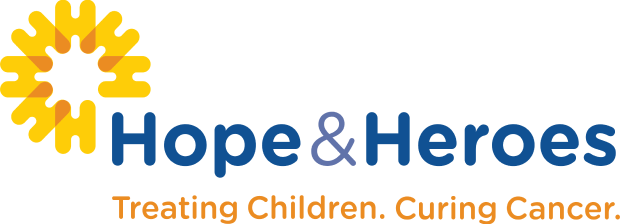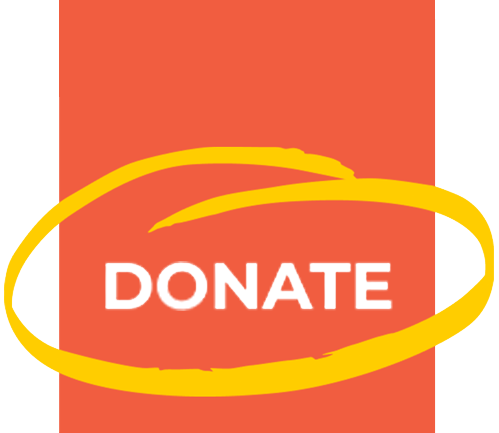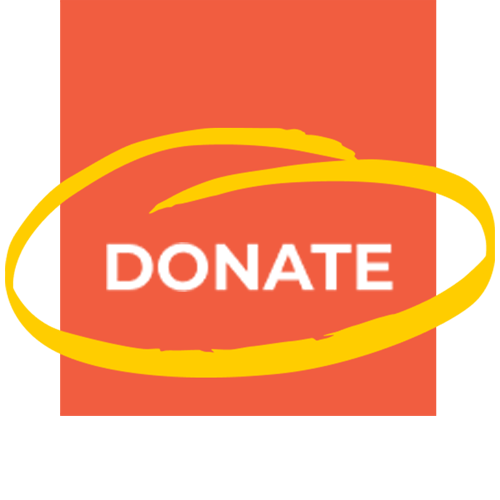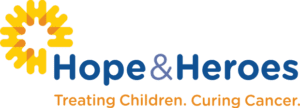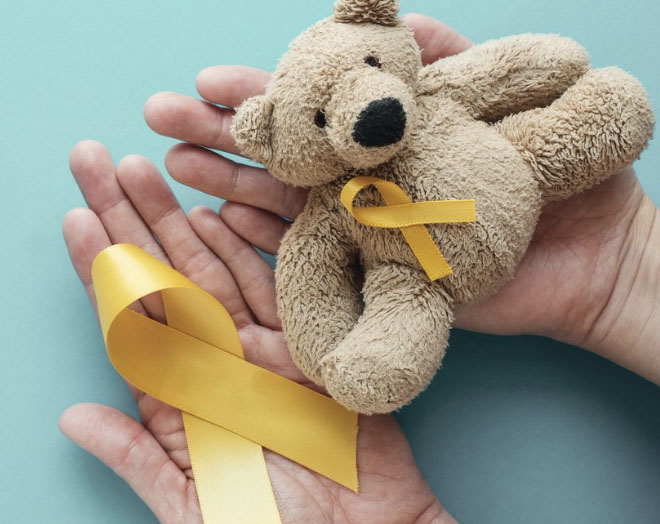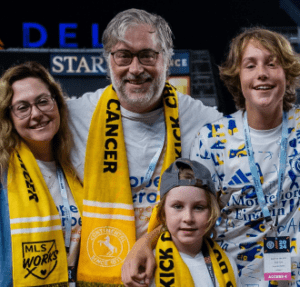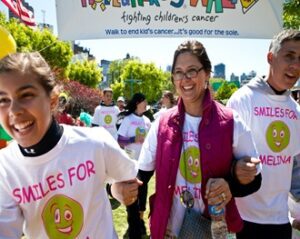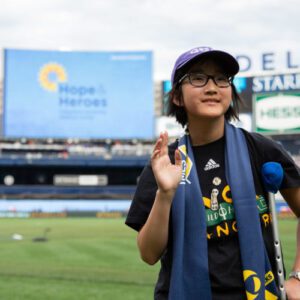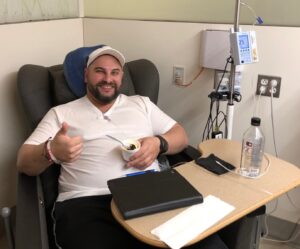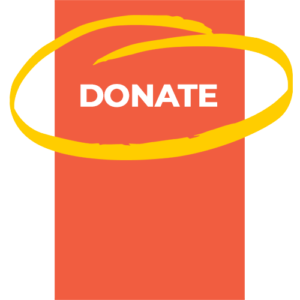When a child is diagnosed with cancer, all focus immediately goes toward his/her treatment and care. Families —and parents in particular— put their lives on hold in order to manage the changes and challenges in that child’s life. It’s often hard to imagine how a family endures during one of the most difficult experiences they may ever face.
But their perspective is important because, as we all know, a child’s diagnosis affects everyone. In honor of National Childhood Cancer Awareness Month, one couple shared the lessons they learned after their son’s diagnosis.
By Karen Capucilli & Jeremy Shatan
Children – Even Babies – Get Brain Tumors.
Jeremy knew children could get cancer because his sister’s best friend (Maggie – say her name) died of leukemia when she was about 12. But when Jacob was diagnosed at fourteen months old we had no idea that someone that young could get such a devastating illness.
That was almost 20 years ago and awareness is much improved today. While we think that is mostly a good thing, childhood cancer is still quite rare and we don’t like it when cancer organizations trade in fear to raise money. For example, one organization sent out a list of “signs of childhood cancer” to millions of people. Not too cool.
Children With Cancer Are Not Little Adults – And They’re More Resilient.
This was explained to us during Jacob’s diagnosis. Pediatric cancers derive from other causes than adult diseases. While those causes are mostly unknown, the rapid division of cells in the growing body may play a role, especially in the severity of illness. Those cells also mean children are very strong and can be subjected to much more rigorous therapies than adults.
We were shocked at the treatment protocol for Jacob’s illness – and didn’t get much sleep after signing the voluminous consent forms – but the more we learned, the more it made sense. This is also one reason why increased funding for childhood cancer research is so important – you can’t expect treatments designed for adults to be successful in children.
100% Doesn’t Exist. Even For Survivors.
Jacob was given a 60% chance of surviving and died 14 months after diagnosis. We’ve heard of other children with a zero percent prognosis who graduated college, got married, and have had children of their own. Standard risk leukemia is hovering at about 95% of cases going into remission – which sounds great unless your child is in the 5%. Each child is an individual and their disease is their disease – how they respond to treatment depends on a variety of factors. The same goes for survivors: late effects, including secondary cancers, are part of the risks of treatment, and also have statistics attached. Ultimately, if it’s your child with cancer, that’s the only “study” you should be focusing on.
You Will Lose Friends. You Will Make New Friends.
Having children is itself a dividing line among groups of friends. Having a sick kid is yet another bridge to cross, and one which some friends may find too far to travel. Mourn the loss if you have to, but as a member of the club to which no one wants to belong, you will make new friends. They might be “foxhole friends” whom you only see during hospitalizations, but you will be grateful for the support from people who truly understand.
If your child does not survive, then you fall into the unenviable category of “every parent’s worst nightmare.” You may lose more friends at that point, even family members may not know what to do with you, but you will find new circles of friends. Some relatives may also step up in unexpected ways. Be open to these changes so you don’t feel too isolated.
Some Of Your New Friends Will Be Part Of Your Child’s Medical Team.
People who choose to become nurses, doctors, social workers, etc. are already special. Those who choose to focus their training and devote their lives to working in the world of pediatric oncology are on another plane entirely. They can become members of the family, going through life-changing experiences with moms, dads, and children under unbelievable stress. And they do it 24/7/365 with dozens of families a year. That looks like heroism to us!
Trust Your Medical Team – Or Find A New One.
During his years working for childhood cancer nonprofits, Jeremy was often asked for advice about where to take children for treatment. While he was unqualified to give medical advice, he would always tell people to seek out the nearest institution that’s a member of the Children’s Oncology Group. That’s one way to know you’re getting state-of-the-art care. He also told parents to trust their medical team implicitly. If you don’t, and you find yourself going to Google to second-guess everything they say, it may be time to make a change if possible. Just like in any of the most important relationships in your life, chemistry is a factor.
Money Is No Object. Until It Is The Object.
Near the end of Jacob’s treatment, his doctors prescribed an oral steroid that we hoped would make him more comfortable. Before leaving the hospital, Jeremy stopped by the crowded pharmacy to pick it up. He handed the scrip to the pharmacist who punched some numbers into a terminal before saying, “That’s going to be $750.” There was an audible gasp among the people waiting for their medications, and then silence as everyone waited to see what Jeremy would do. It almost seemed as if the pharmacist expected Jeremy to say, “Forget it, that’s too much!” But Jeremy whipped out a credit card without hesitation. If your child was fighting for their life, wouldn’t you do the same?
But when treatment is over, whatever the final result, and you come up for air, you might find your financial situation completely different than it was prior to diagnosis. Judging yourself for this is not an option. Every decision, financial and otherwise, you made along the way was the best one based on the information you had at the time. While it may take a while, you can repair your finances, even if you need assistance from several sources.
You Will Have To Accept Help. Make Sure It’s The Help You Need.
Right from the moment of diagnosis, which may include an emergency stay in the hospital for a night (or even days or weeks), you will need to call on extra sets of hands. You might need someone to care for your other children. People at work will have to cover for you. You might need a change of clothes and a toothbrush or a meal brought to the hospital. We quickly realized how important it was to accept help when offered, but sometimes people would do unhelpful things.
In order to make our needs known, we would send out group emails and ask others to forward them around to additional people. Now, there are wonderful services like Caring Bridge or Lotsa that can help you spread the news and schedule support very easily. To really lighten your load, you can even delegate management of these services to another person.
Childhood Cancer – And Death – Disrupts The Natural Order.
From a young age, we take for granted that older people get sick and die. This is part of the “circle of life,” the rulebook to which all living things are subjected. But when a child is diagnosed with a life-threatening illness, this foundational principle is rocked to its core, making us feel off-kilter in our lives. What other truths are temporary or provisional? Will the sun continue to rise and set? How safe are our other children? Integrating this “new normal” into our lives took time and each of us needed to support the other to get to a place where we could do things like plan something a week in advance.
The “New Normal” Is Not Normal.
If “normal” is by definition what is experienced by the greatest number of people, having a child with cancer, or losing a child at a young age, is – thank goodness – not normal at all. After Jacob died, we each had moments where we felt like were acting crazy and Jeremy would say, “We’re not crazy – a crazy thing happened to us and we’re just coping with that.” This doesn’t occur so often these days, but even if we have accepted the way things are doesn’t mean we have “gotten over” Jacob’s death. We’ve just learned to live with it, which is an ongoing process that will continue for the rest of our lives.
You Can Find Joy Again.
In 2003, 50 Cent rapped, “Sunny days wouldn’t be special if it wasn’t for rain/Joy wouldn’t feel so good if it wasn’t for pain,” which can be a helpful roadmap to living in a world where everything is bittersweet. While watching Jacob’s younger sister graduate high school and go off to college was yet another reminder of all he had missed out on, it still brought us immense happiness and pride as she continues on her path in life.
Do we wish things were different? Of course. But we’ve already been robbed of taking pleasure in Jacob growing up and we refuse to let cancer steal more from us.
Authors: Jeremy Shatan is the former executive director of Hope & Heroes and is now director of development at the New York Genome Center. Karen Capucilli is a trained professional photographer and is currently a stay-at-home-mom. They live in Inwood, in upper Manhattan, with their two surviving children. January 2018 will mark Jacob’s 21st birthday.
